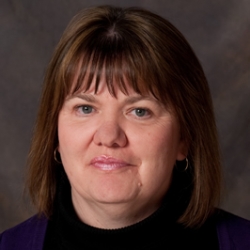Simulation research, real-world honour
July 12, 2016
Share
Marian Luctkar-Flude introduced clinical simulation to Queen’s University students in 2005 and this pioneering work has culminated in her being the first Canadian to earn the Excellence in Research Award from the International Nursing Association for Clinical Simulation and Learning (INACSL).

Dr. Luctkar-Flude is a Canadian leader in nursing education using simulation, and was one of the first in Canada to bring simulation training and interprofessional education together.
“I’m humbled and honoured to win this award,” says Dr. Luctkar-Flude. “It’s truly an award for my entire body of simulation research.”
She started at Queen’s in 2001 as a clinical instructor and in 2005 became the new simulation lab coordinator. In that role she introduced clinical simulation to nursing students and collaborated with faculty from the Schools of Medicine and Rehabilitation Therapy to develop and evaluate simulation modules for nursing, medicine and physical therapy students.
“The government funded simulation equipment for nursing students so they could experience and learn to deal with high risk situations they may not be exposed to in their clinical rotations,” Dr. Luctkar-Flude says. “We introduced it here at Queen’s to a broader range of students, and it proved to be an invaluable experience where students from different disciplines can learn about teamwork and communication together.”
The current mannequins used in the simulation labs are more sophisticated than earlier models. They include technology that allows an instructor to speak to the student through the mannequin and also to simulate a wide range of health conditions. Clinical simulation experiences can also involve standardized patients who are individuals trained to play the roles of patients, family members or other health professionals.
According to Dr. Luctkar-Flude, “with standardized patients, students are often more emotionally engaged because they are alive, however, the computerized mannequins are better for scenarios where we need to change the heart rate, or blood pressure to portray a patient whose condition is worsening.”
While the award recognizes years of research contributions, Dr. Luctkar-Flude by no means sees it as a lifetime achievement award. She is now concentrating on an area of research that will improve the simulation experience.
“I’m doing research into how valuable it would be to tell the student what will be happening in the simulation before they enter the room as opposed to expecting them to just apply what they have learned in a lecture,” she says. “We have discovered that many students are anxious and stressed in a simulation experience, and that affects learning. If they are better prepared, we suspect they will get more out of the simulation.”
Dr. Luctkar-Flude presented this new research at the INACSL conference where she earned her award.